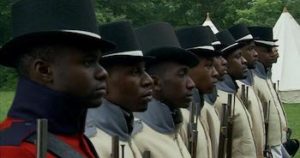
*Black history and the War of 1812 are celebrated on this date in 1812. This was a conflict between England and the United States.
Blacks fought on both sides, though many fought for the same reason: freedom from chattel slavery. In the Revolutionary War, black and white patriots fought together, which helped convince many Northern states to abolish slavery in the following years. For many free blacks in the North and enslaved in the South, there was a real hope that fighting in another war would create a pathway to emancipation.
One difference between the War of 1812 and the Revolutionary War was that the military was segregated by the early 19th century. Many branches would not even allow blacks to serve. As the conflict quickly escalated, permitting black soldiers became necessary. Many Blacks found service opportunities in the Navy, where fighters were needed the most in the early years of the war. About 15% of Navy sailors during the War of 1812 were black. Furthermore, the tight quarters of the ships made racial segregation impossible to enforce, and many became amicably integrated as white and black crew members worked, fought, and lived side-by-side.
To the British, enslaved Africans in the South provided an opportunity to generate a large, motivated army already on American soil. The British instituted a policy that slaves who escaped would be granted freedom after serving in the British military. Between 4,000 and 5,000 enslaved people accepted the offer and found freedom by fighting against the colonies. Some even partook in the infamous burning of Washington, D.C., as the British advanced. While the British encouraged enslaved people to escape, they never promoted slave rebellions in the South. With their plantations across the West Indies, slave revolts were not something the British did not want to see slave revolts fostered in the Western Hemisphere. The War of 1812 strengthened the relationship between African slaves and indigenous Native Americans.
Bonds with the Creek and Seminole tribes happened in Spanish-held Florida, where facilities like the Negro Fort were built. This war provided numerous opportunities to escape enslaved people in the South. The British Royal Navy's blockades and raids allowed about 4,000 Africans to escape slavery by fleeing American plantations aboard British ships. Enslaved Africans who settled in Canada were known as Black Refugees. The blockading British fleet in the Chesapeake Bay received increasing numbers of formerly enslaved people during 1813. British government orders made them considered free persons when they fell into British hands.
Alexander Cochrane's proclamation invited Americans who wished to emigrate to join the British. Although it did not explicitly mention enslaved people, it was understood by all to be addressed to them. About 2,400 escaped enslaved people and their families were transported to the Royal Naval Dockyard in Bermuda. There, they were employed to work about the yard and organized as a militia to aid in the defense of the yard. Nova Scotia and New Brunswick during and after the war. In May 1814, younger male volunteers were recruited into a new Corps of Colonial Marines.
They fought for Britain throughout the Atlantic campaign, including the Battle of Bladensburg, the attacks on Washington, D.C., and the Battle of Baltimore, before withdrawing to Bermuda with the rest of the British forces. They settled in Trinidad after rejecting orders for transfer to the West India Regiments, forming the community of the Merikins (none of the formerly enslaved people remained in Bermuda after the war). These escaped enslaved people represented the largest emancipation of Africans before the American Civil War. Britain paid the United States for the financial loss of the enslaved people at the war's end.
Blacks played an essential part in many battles, such as the Battle of Lake Erie, the fighting around Baltimore, the bombardment of Fort McHenry, and the Battle of New Orleans. It was during the Baltimore conflict that the American national anthem, the Star Spangled Banner, was written. Many blacks sacrificed everything for a country that did not treat them equally. Many stories are lost to time because of this unequal status. The War of 1812 was the first conflict in which Congress formally declared war. It was a moment that helped the U.S. achieve a bit more international respect and recognition as a functioning country that could hold its own.
The end of the War of 1812 was also significant for another reason: it marked the start of the Antebellum period, the era before the American Civil War. This was when the North and South became so entrenched in opposing views that reconciliation was no longer possible. This was also when massive plantations flourished, and slavery truly came to define Southern life. The war officially ended on February 17, 1815.